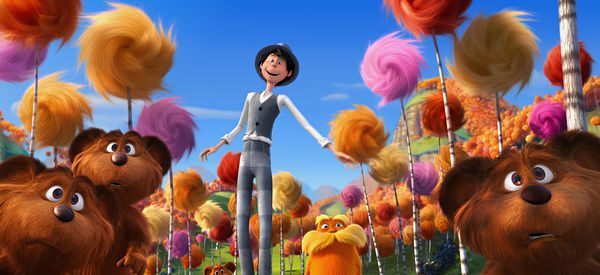3D动画《老雷斯的故事》票房夺冠五大启发
3D动画《老雷斯的故事》
票房夺冠五大启发
Dr. Seuss' The Lorax:
Five lessons from its box-office success
《老雷斯的故事》(The Lorax)讲述了一个叫文斯勒(Once-ler)的人,为了赚钱如何将一个人间仙境变成了一片荒漠的故事。当文斯勒发现一个美丽的乐园,没有听罗拉克斯的警告,过度利用资源而将所有树木砍来作无用之物。当生态破坏到了没有任何地方可供动物栖息时,乐园变成了无生气的沙漠。那么,人类是否曾想过当地球资源也被耗尽和污染的情境呢?希望藉此故事来唤醒人类来保护地球吧!
Even for a season that has seen surprisingly strong box office, "Dr. Seuss' The Lorax" was an eyebrow-raiser this weekend. The $70.7 million that the movie took in domestically made it worthy of several superlatives -- among others, the biggest opening ever for a non-sequel animated film (a bit of a fudge given that the $70.47 million "The Incredibles" tallied was in 2004 dollars, but still impressive) as well as the biggest opening since July for any movie without the word "Twilight" in its title.

Among the lessons from this bounty are some obvious ones, like the fact that kids love cute, brightly colored animated creatures.
Here, then, are five things we might not have expected coming into the weekend.
Animated blockbusters need a spring or holiday date. Big animation releases have been creeping up the calendar for a while now: "Monsters vs. Aliens," "How to Train Your Dragon" and several of the "Ice Age" movies all opened in mid- to late March. But none of those opened as strong as Universal Pictures/Illumination Entertainment's "Lorax." And "Rango," which a year ago went out on the same weekend as "Lorax," tallied barely half of the Seussian film's total. In fact, every other animated movie to open to at least $70 million did it in the far more fertile May-November period, per Box Office Mojo.
Picture books are a mixed bag. They've been bedtime favorites for generations. But movies based on picture books -- whether the films are animated, live-action or a combination thereof -- have made plenty of people turn off the lights. In the last few years, movies such as "Where the Wild Things Are" and "Mr. Popper's Penguins" "have been commercial disappointments, while even Seuss' own "The Cat in the Hat" flopped back in 2003. It's not easy for a 90-minute film to convince moviegoers it's filled in the gaps of such books -- at least, it wasn't easy before "Lorax."
Politics don't sell. Few animated movies take a hit from even one political flank. "Lorax" got it from both sides. Liberals said its many cross-promotions (Mazda SUVs, anyone?) betrayed Theodor Geisel's eco-friendly message, while Breitbartians said the movie was a Trojan horse for Hollywood-flavored liberalism. Either one might have been enough to keep sections of the moviegoing audience at home. It didn't -- proving that, perhaps, if you're going to annoy an ideological constituency, maybe it's best to annoy its opposite too.
Voices need names. Animated movies never have been as star-studded as they are now -- Owen Wilson, Anne Hathaway and Johnny Depp have all toplined them, getting paid millions, as Chris Rock might say, for reading some lines in a booth. But though "Lorax" didn't exactly go for unknowns, it rummaged somewhere besides the movie-star closet: the inflections of Danny Devito, Taylor Swift, Zac Efron and Ed Helms brought the main characters to life. Of course, it helps that Devito brings this much effort to the role.
Animated movies don't have to be good to make money. And by good, of course, we mean well-reviewed. The modern notion that the two go hand-in-hand was introduced by Pixar and bolstered by DreamWorks Animation -- see: the phenomenal 94% "Up" scored on Movie Review Intelligence, the very good 77% of "How to Train Your Dragon," or even the solid 69% for Illumination's earlier "Despicable Me." Sometimes it's seemed that quality and dollars have been almost inextricable. That's now been disproved by "The Lorax." The movie garnered just 57.8% on Movie Review Intelligence and prompted New York Times critic A.O. Scott to offer, in a phrase that went viral practically the moment he came up with it, that the film was a "noisy, useless piece of junk."